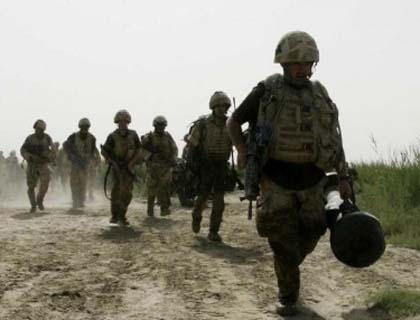WASHINGTON - Top Pentagon officials are considering putting elite special operations troops under CIA control in Afghanistan after 2014, just as they were during last year's raid on Osama bin Laden's compound in Pakistan, sources told The Associated Press.
The plan is one of several possible scenarios being debated by Pentagon staffers. It has not yet been presented to Secretary of Defense Leon Panetta, the White House or Congress, the sources said.
If the plan were adopted, the U.S. and Afghanistan could say there are no more U.S. troops on the ground in the war-torn country because once the SEALs, Rangers and other elite units are assigned to CIA control, even temporarily, they become spies.
No matter who's in charge, the special operations units still would target militants on joint raids with Afghans and keep training Afghan forces to do the job on their own.
The idea floated by a senior defense intelligence official comes as U.S. defense chiefs try to figure out how to draw down troops fast enough to meet the White House's 2014 deadline. Pentagon staffers already have put forward a plan to hand over much of the war-fighting to special operations troops. This idea would take that plan one step further, shrinking the U.S. presence to less than 20,000 troops after 2014, according to four current and two former U.S. officials, who spoke on condition of anonymity because the program involves classified operatives.
George Little denied the idea is being discussed. "Any suggestion that such a plan exists is simply wrong," Little said Saturday. "United States special operations forces continue to work closely with the intelligence community to confront a range of national security challenges across the world."
Reducing the U.S. presence faster would be a political boon for the White House and the Afghan government, with Afghan sentiment raw over incidents ranging from civilian casualties from U.S. strike operations to the recent burning of Qurans by U.S. troops.
But a CIA-run war would mean that the U.S. public would not be informed about funding or operations, as they are in a traditional war. Oversight would fall to the White House, top intelligence officials, and a few congressional committees. Embedding journalists would be out of the question.
Two senior defense officials said that neither the CIA nor Special Operations Command has put this plan forward officially to Panetta. The other officials who said they have been part of discussions about the plan say it would require the assent of the White House and congressional oversight committees, and would be contingent upon the approval of the Afghan government. The idea has not yet been presented at any of those levels, the sources said.
The CIA's intelligence and paramilitary elements regularly work alongside special operations units, both in the war zone and in areas where militants operate. On a case-by-case basis, elite special operations units are assigned to the CIA for missions when the U.S. wants total deniability, usually in areas where the U.S. is operating without the local government's permission, as in the bin Laden raid.
The notion of longer-term assignments to the CIA does not sit well with some senior special operations commanders, who want their units to remain autonomous in order to keep their troops under Defense Department legal parameters. If CIA-assigned troops are captured, for example, they are treated like spies, not protected by the Geneva Conventions, which govern the treatment of prisoners of war.
But putting special operations troops in the CIA's employ in Afghanistan could be attractive to the Afghan government because it would make the troops less visible and give Afghan President Hamid Karzai the added bonus of being able to say U.S. troops had withdrawn from his country. Technically, he would be right: Troops would have been rendered as spies by answering to the CIA's Kabul station chief instead of a U.S. military commander.
Such troops would presumably augment the CIA's current training and partnership with Afghanistan's own elite paramilitary intelligence forces, the Counterterrorism Pursuit Teams.
Afghan officials, and the general public in Afghanistan, express much warmer sentiments toward the CIA than to U.S. special operations troops, after a decade of occupation has built up anger and bitterness over civilian casualties from special operations night raids. The CIA as an institution seems to have escaped that collective Afghan resentment, with Afghan officials eager to tell visiting reporters that they regularly work with "OGA," or "Other Government Agency," the slang term for the CIA.
CIA Director David Petraeus, a former Afghanistan war commander, is grappling with a vast new global mission and far fewer troops than he is used to—or that he needs to carry it out, especially if the CIA ends up with the bulk of the mission after troops withdraw from Afghanistan, according to current and former officials familiar with internal CIA debates. The CIA's paramilitary Special Activities Division that both gathers intelligence and works with local intelligence and security forces numbers only a few hundred people, and the overall clandestine service has less than 5,000.
Petraeus took charge at the agency last year, while Libya was still convulsed by civil war and leader Moammar Gadhafi was on the loose. He ordered his top officials to "send all your available teams into Libya," only to be told they already had deployed all the manpower available, a single team, two former officials said.
To make up for such shortfalls, the agency normally hires extra people, often retired special operators with the requisite security clearance, military training and language ability. But the government mandate to slash contractor use has meant cutting contracts, according to two former officials familiar with the agency's current hiring practices. Special operations troops could fill that gap, officials said. (AP)

